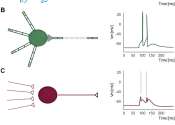Plastic is the general common term for a wide range of synthetic or semisynthetic organic amorphous solid materials suitable for the manufacture of industrial products. Plastics are typically polymers of high molecular weight, and may contain other substances to improve performance and/or reduce costs.
The word derives from the Greek πλαστικός (plastikos) meaning fit for molding, and πλαστός (plastos) meaning molded. It refers to their malleability, or plasticity during manufacture, that allows them to be cast, pressed, or extruded into an enormous variety of shapes—such as films, fibers, plates, tubes, bottles, boxes, and much more.
The common word plastic should not be confused with the technical adjective plastic, which is applied to any material which undergoes a permanent change of shape (plastic deformation) when strained beyond a certain point. Aluminum, for instance, is plastic in this sense, but not a plastic in the common sense; while some plastics, in their finished forms, will break before deforming and therefore are not plastic in the technical sense.
There are two types of plastics: thermoplastics and thermosets. Thermoplastics, if exposed to enough heat, will melt. Thermosets will keep their shape until they are charred and burnt. Some examples of thermoplastics are grocery bags, piano keys and some automobile parts. Examples of thermosets are children's dinner sets and circuit boards.









